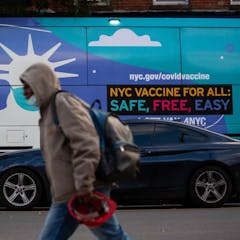
Articles on Black health disparities
Displaying all articles

As it is now, the transplant system treats kidneys from all Black donors as if they are at higher risk for failing, even though only some are.

Many Black patients experience stark differences in how they’re treated during medical interactions compared to white patients.

Anti-Black racism has health, social and economic consequences for Black populations in Canada. Partnering with Black communities is a crucial component in effective efforts to mitigate inequities.

Black women died during or soon after pregnancy at higher rates than any other racial group in every year from 1999 to 2019. American Indian and Alaska Native women had the greatest increase in risk during this period.

Biased algorithms in health care can lead to inaccurate diagnoses and delayed treatment. Deciding which variables to include to achieve fair health outcomes depends on how you approach fairness.

Chronic stress from living with systemic racism and gun violence can lead to increased symptoms of PTSD and depression as well as elevated cortisol levels.

Early detection of breast cancer is critical to improving chances of survival. But racial and ethnic minority patients systematically have delayed diagnoses that reduce the benefits of screening.

Earlier detection and treatment of COVID-19 by health care providers in pharmacies could help prevent surges in infection rates and severe illness.

Vaccines and medical treatments can only go so far in an unequal society. Facing the ongoing history of racial discrimination and bias in the US would help end the pandemic.

Carrying a pregnancy to term is riskier than having an abortion, especially for non-Hispanic Black women.

New research points to a biological way that racism can lead to health disparities.

Microaggressions are more subtle than outright discrimination. But they can directly affect HIV treatment outcomes.

Researchers had suspected that chemical hair relaxers might be behind racial disparities in breast cancer diagnoses. A new study narrows in on lye as a possible cause for that link.

Though COVID-19 has killed Black Americans at nearly twice the rate as white Americans, Black people are the least likely racial group to say they’re eager to get the vaccine.

A study of 800 Black American families shows early experiences of racism have long-term consequences for physical and mental health.

Getting the real answers on health gaps requires a deep dive into the demographics.

Pluralism — the active process of inclusion — could reduce disparities in some of the most pressing health issues of our time.

Blacks are dying at higher rates from COVID than whites, showing yet another example of gaps in outcomes between blacks and other groups. The cause is more sociological than biological.
